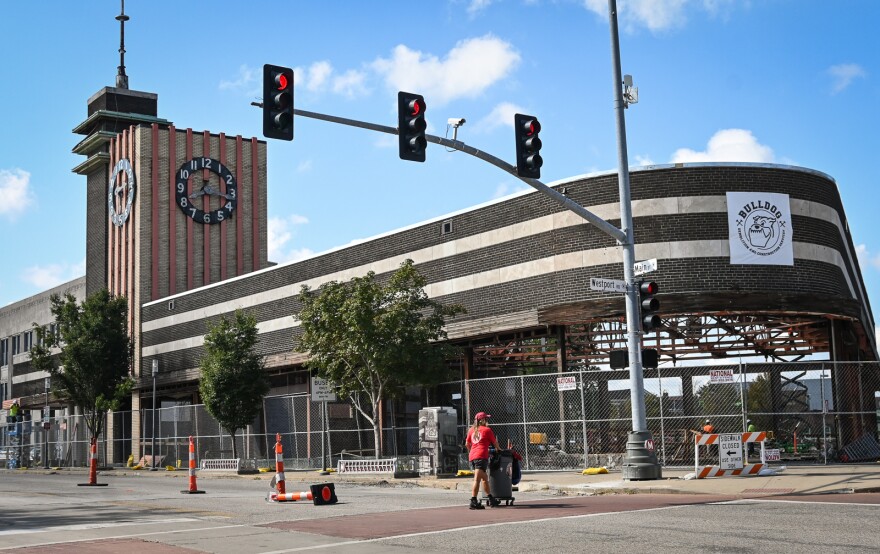The historic Katz Drug Store building standing on the corner of Westport Road and Main Street in midtown Kansas City is getting a major face lift. The roof has been removed, exposing the steel frame of the building, the back wall has been torn out and wired fences surround the block.
Aided by a City Council-approved tax incentive package, St. Louis developer Lux Living plans to turn the former drug store into amenities for a 192-unit luxury apartment complex that Lux is developing nearby at a cost of $37.6 million. The developer’s plan calls for constructing a fitness center, rooftop pool, audio studio and co-working spaces for apartment residents.
With the area rezoned with an urban renewal designation, Lux Living must meet certain requirements, including constructing a pedestrian path, securing approval for a streetscape plan and ensuring that the roof over outdoor seating on the new building does not obscure the iconic Katz tower.
The Katz building was built in the 1930s and was placed on Historic Kansas City’s “most endangered buildings” list in 2019. Redeemer Fellowship Church bought the building at auction in 2019 and sold it to Lux in January. For a few years, the space supported local artists.
Fourth District Councilman Eric Bunch, whose district includes Midtown, said he supports the project because it creates more housing and preserves the building’s historic structure. Ultimately, he said, that will mean a more densely populated Midtown neighborhood.
“Part of my job is to ensure that we increase the tax base and that we do that by bringing in more residents,” Bunch said.
Bunch noted that Midtown used to be more densely populated than it is now.
“I think it's a good thing to have more neighbors,” he said. “More people living off the streetcar means more people riding the streetcar, more people riding other forms of public transit, more people walking. The neighborhoods become safer.”
Kevin Klinkenberg, executive director of Midtown KC Now, said he was encouraged to see the project moving ahead.
“To have the streetcar coming down Main Street, to have new development that has density to it and walkability — those are the kinds of things that we've been hoping for all along,” Klinkenberg said.
Initially, Lux Living asked the city for a 15-year tax abatement for the project: 75% for 10 years and 50% for the next five years.
The tax incentive plan ultimately approved by the City Council provides a 75% tax abatement over 10 years and $600,000 from the Midtown Public Infrastructure Advisory Committee fund, which uses sales tax dollars for infrastructure projects.
Pushback from residents
The journey from the initial project proposal to final approval was rocky at times.
In January, before the sale of the building was completed, Kansas City resident Dylan Pyles gathered signatures on a letter urging Redeemer Fellowship not to sell the building, arguing the project would contribute to the displacement of longtime Midtown residents.
The letter gathered more than 200 signatures. Pyles said he was disappointed the church went forward with the sale.
“When they took over the other buildings that they own on that block, they had an opportunity to work against and resist the trends of gentrification that were happening in Midtown, as well as the trends of displacement,” Pyles said. “And at every turn, in my opinion, they've made a decision to work in service of those trends and to actually further them along.”
He added: “There's a history … in Kansas City of building specifically around real estate interests and development, and not around what's actually affordable for the people who live in the city.”
Controversy has also surrounded the developer. While Lux Living has invested millions of dollars in apartment buildings in St. Louis, the St. Louis Post-Dispatch reported that renters experienced problems with maintenance, security and unfinished units when they moved in.
Earlier this year, when Lux Living sought tax abatements for another apartment complex along Kansas City’s Berkley Riverfront, it did not disclose to Port KC that its chief executive, Victor Alston, was sanctioned in 2017 by the Securities and Exchange Commission when he led a different California-based company.
The SEC found that Alston broke accounting rules and banned him from serving as an officer or director of a publicly traded company for five years. He was also ordered to pay a $100,000 fine.
Lux Living is moving ahead with its seven-story residential building at Berkley Riverfront, but without any tax incentives.






